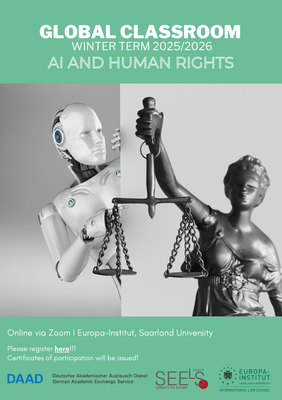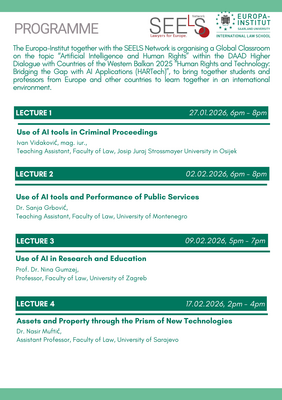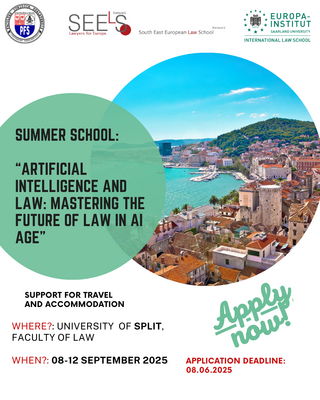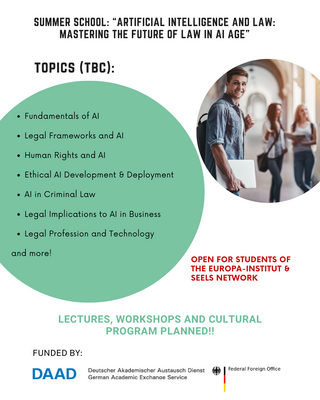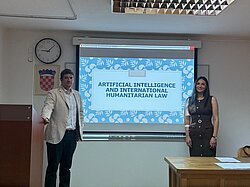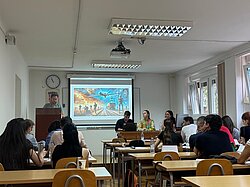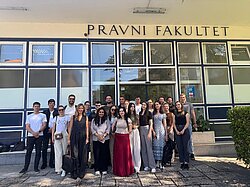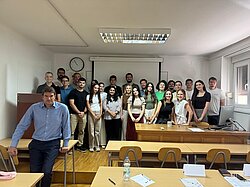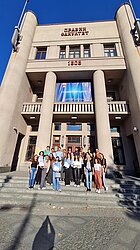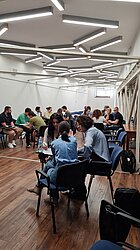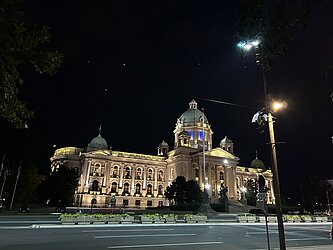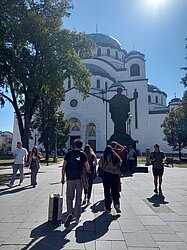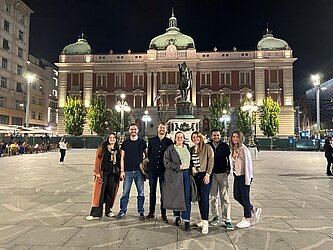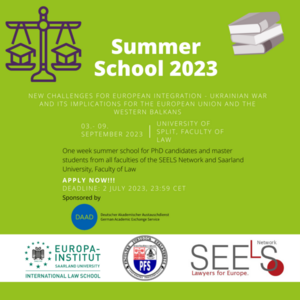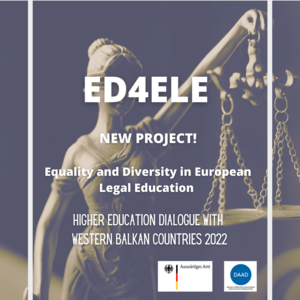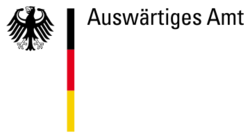
The DAAD Higher Education Dialogue aims to promote cooperation and exchange between universities in the target region and to strengthen the ties between the target countries and the EU. The European perspective for the Western Balkan states is important for the preservation of peace and the stabilization of this region.
The DAAD Higher Education Dialogue with the countries of the Western Balkans - former DAAD Academic Reconstruction - is a programme funded by the German Academic Exchange Service (DAAD) and the German Foreign Office. This program is organized annually since 2013 by the Europa-Institut in cooperation with the South East European Law School Network (SEELS) and the partner faculties from Albania (Tirana), Bosnia and Herzegovina (Sarajevo and Zenica), Croatia (Osijek, Rijeka, Split, Zagreb), Northern Macedonia (Skopje) and Serbia (Belgrade and Nis).
The aim of the DAAD Higher Education Dialogue is to create a network of lawyers in the field of postgraduate teaching and research on various topics related to European and International law. Since the beginning of the cooperation various summer schools, workshops, training courses have taken place in Saarbrücken and the especially in partner countries.
- 2025 “Artificial Intelligence and Law: Mastering the Future of Law in AI Age” - Higher Education Dialogue 2025 (Croatia - Split)
- 2024 ELEC Preparing for EU Accession - Higher Education Dialogue 2024 (Serbia - Belgrade)
- 2023 "New Challenges for European Integration - Ukrainian War and its implications for the European Union and the Western Balkans" - Higher Education Dialogue 2023 (Croatia - Split)
- 2022 ED4ELE - (Equality and Diversity in European Legal Education) - East-West Dialogue: Higher Education Dialogue with the Western Balkan Countries 2022 (Croatia - Split)
- 2020 Rule of law: Arbitration as an opportunity for peaceful dispute settlement (Kroatien – Zagreb) because of the Covid-19- pandemic ONLINE
- 2019 #FreeMedia4WesternBalkans (Kroatien – Split)
- 2018 Access2Justice4All (Serbien – Belgrad)
- 2017 Protection of Ethnic Minorities (Albanien – Durrës)
- 2016 Challenges of Migration and Asylum – Legal Aspects (Nordmazedonien – Ohrid)
- 2015 EU Open Markets (Kroatien – Zagreb & Split)
- 2014 Essentials of European Law (Kroatien – Zagreb & Rijeka)
- 2013 Summer Academy SEE Graduates EU Law Teaching & Research Academy (Saarbrücken)
Through the years, almost 200 students on their Master's or doctoral studies from Saarbrücken and the partner countries as well as many professors and experts from Germany, countries in South-East Europe and other countries worldwide have participated in these projects.
The Europa-Institut together with the South East European Law School Network and the partner faculties will continue to organize interesting and current projects in the future. The participants of these projects will be able to further deepen their knowledge in the fields of European and International law as well as build a network with colleagues from other countries.
HARTech: Human Rights and Technology: Bridging the Gap with AI Applications - Higher education dialogue 2025
Global Classroom “Artificial Inteligence and Human Rights”
The Europa-Institut together with the SEELS Network is organising a Global Classroom on the topic “Artificial Inteligence and Human Rights” within the DAAD Higher Dialogue with Countries of the Western Balkan 2025 “Human Rights and Technology: Bridging the Gap with AI Applications (HARTech)”, to bring together students and professors from Europe and other countries to learn together in an international environment.
There are 4 sessions via Zoom, certificates of participation will be issued.
Please register here until 23 January 2026.
Summer School: "Artificial Intelligence and Law: Mastering the Future of Law in AI Age"
Within the project "Human Rights and Technology: Bridging the Gap with AI Applications (HARTech)" funded by the DAAD (German Higher Education Exchange Service) and implemented by the Europa-Institut, University of Saarland (Germany), and the Faculties of Law, members of the SEELS Network, a summer school on AI and law is organised as part of a global classroom. From September 7 to 13, the summer school “AI and Law: Mastering the Future of Law in the AI Age” took place at the Faculty of Law of the University of Split. It aimed to provide the students with an intensive learning experience and gave them a comprehensive understanding of key aspects related to Law and new technologies with special focus on artificial intelligence (AI). The Summer School was based on a multidisciplinary program designed to explore the intersection of technology, ethics, and legal studies. Participants could gain a solid foundation in the fundamentals of AI, while exploring its legal frameworks and implications in diverse areas such as human rights, business law, criminal law etc. The curriculum emphasized ethical AI development and deployment, equipping students to address pressing challenges in the digital age. With sessions on AI-enhanced academic and legal research, alongside discussions on how AI is reshaping the legal profession and education, this program offered insights into the future of law in an AI-driven world.
The project was financially supported by the DAAD and the Federal Foreign Office of Germany.
ELEC: Preparing for EU Accession - Higher education dialogue 2024
BOOT CAMP "Students, EU enlargement policy and EU integration - the good, the bad, and the active"
From September 18 to 21, 2024, the boot camp “Students, EU Enlargement Policy and EU Integration - The Good, The Bad, and the Active” took place in Belgrade, Serbia. 23 students from universities that are part of the SEELS network (University of Zagreb, University of Zenicas, University of Tirana, University of Belgrade, University of Nis, University of Split, University of Rijeka, Josip Juraj Strossmayer Universitxy of Osijek, Ss. Cyril and Methodius University of Skopje, University of Montenegro, University of Sarajevo) and from Saarland University met in the lecture halls of the Faculty of Law of the University of Belgrade to attend lectures on the EU, its functions, EU enlargement including the perspectives of the Western Balkans and human rights. Digital research skills and youth in action were also covered. The program was held in English and covered the following main topics: The EU and its Functions, Human Rights in the EU Legal System, EU Single Market Law, Free Movement of Students, EU Enlargement Policy, EU Integration, Youth Policy in the EU, Youth in Action. The bootcamp included interactive workshops to develop students' skills and understanding of how to use EU law and policy digital resources, project development and implementation, study visits and cultural events. As part of the bootcamp, students had the opportunity to interact and learn from each other and the lecturers while getting to know the city of Belgrade and Serbian culture. After four intense days of lectures and sightseeing, the bootcamp ended with a farewell dinner at a popular local restaurant on the Sava River.
Applications are closed! (Deadline: 02.08.2024)
Summer School "New Challenges for European Integration - Ukrainian War and its implications for the European Union and the Western Balkans"
The Summer School will take place at Faculty of Law, University of Split from 03 till 09 of September 2023 (03 and 09 a half-day programme is planned – on arrival day in the afternoon/ on departure day in the morning – the rest of these days is for arrival and departure). It will be organized within the framework of the project “New Challenges for European Integration - Ukrainian War and its implications for the European Union and the Western Balkans” of the SEELS network faculties and the Europa-Institut of Saarland University (Germany), financially supported by DAAD and Federal Foreign Office of Germany.
The summer school is aiming to introduce students and young academics to the new challenges for European Integration due to the Russo-Ukrainian War and its implications for the European Union and the Western Balkans. A special emphasis will be put on the EU accession process and the EU neighbourhood policy. The participants should be made more aware of the topic and enabled to recognise deficiencies and defuse situations through knowledge of the legal framework, and in particular to understand the complexity of the EU accession process. Moreover, interactive trainings and workshop sessions should foster the discussion among the participants
The program was delivered in English with a selection of the following topics (preliminary list, changes will be possible): Russo-Ukrainian war, development, history and reasons; International Public Law in the times of war; Refugees from Ukraine in Europe; Fighting War Crimes with International Criminal Law; Reactions of the European Union – Supporting Ukraine, Sanctioning Russia; EU Enlargement Policy: Who´s next?; A new strategy for the EU Neighborhood Policy; NATO or European Union: Developing an European Security strategy; Mobility of people and goods: Food and worker markets; How to secure the energy supply; We waited longer: conditionality and fairness in the accession process; New models for European Integration.
Please note: The application deadline for the Summer School was 2 July 2023.
Dr. Mareike Fröhlich, LL.M.
Project Coordination
Tel.: +49 (0)681/302-3653
E-mail: projects(at)europainstitut.de
ED4ELE (Equality and Diversity in European Legal Education)
East-West Dialogue: Higher Education Dialogue with Western Balkan Countries 2022
In the summer of 2022, under the direction of Prof. Dr. Thomas Giegerich LL.M. (Co-Director of the Europa-Institut and Chair of European Law, Public International Law and Public Law), there was a university dialogue with the countries of the Western Balkans at the Europa-Institut of Saarland University. The project, entitled "ED4ELE" (Equality and Diversity in European Legal Education), aimed to identify similarities and differences in the legal and institutional fields of law studies among the partner countries in the project Albania, Bosnia and Herzegovina, Croatia, Northern Macedonia, Montenegro, Serbia and Slovenia. The project was funded by the German Academic Exchange Service (DAAD) with funds from the German Foreign Office (AA) as part of the program "University Dialogue with the Countries of the Western Balkans", the funding amount is almost 40,000 euros. The main objective of the project was to expand the existing networks between the Europa-Institut and the partner countries to include the topic of equality and diversity in legal education. Within this framework, among other things, a Summer School with 25 young academics was successfully organized in Split, Croatia, from September 4 to 10, 2022, to facilitate cross-border exchange and networking among law faculties in the Western Balkans region and between German and foreign universities, students and young academics.
The DAAD Higher Education Dialogue with the countries of the Western Balkans - former DAAD Academic Reconstruction - is a programme funded by the German Academic Exchange Service (DAAD) and the German Foreign Office. This program is organized annually since 2013 by the Europa-Institut in cooperation with the South East European Law School Network (SEELS) and the partner faculties from Albania (Tirana), Bosnia and Herzegovina (Sarajevo and Zenica), Croatia (Osijek, Rijeka, Split, Zagreb), Northern Macedonia (Skopje) and Serbia (Belgrade and Nis). The aim of the DAAD Higher Education Dialogue is to create a network of lawyers in the field of postgraduate teaching and research on various topics related to European and International law.
Sine the beginning of the cooperation various summer schools, workshops, training courses have taken place in Saarbrücken and the especially in partner countries. Through the years, almost 200 students on their Master's or doctoral studies from Saarbrücken and the partner countries as well as many professors and experts from Germany, countries in South-East Europe and other countries worldwide have participated in these projects. The Europa-Institut together with the South East European Law School Network and the partner faculties will continue to organize interesting and current projects in the future. The participants of these projects will be able to further deepen their knowledge in the fields of European and International law as well as build a network with colleagues from other countries.
Country Reports on Equality and Diversity in Higher Education as a result of the Round Table in Belgrade can be found here.

